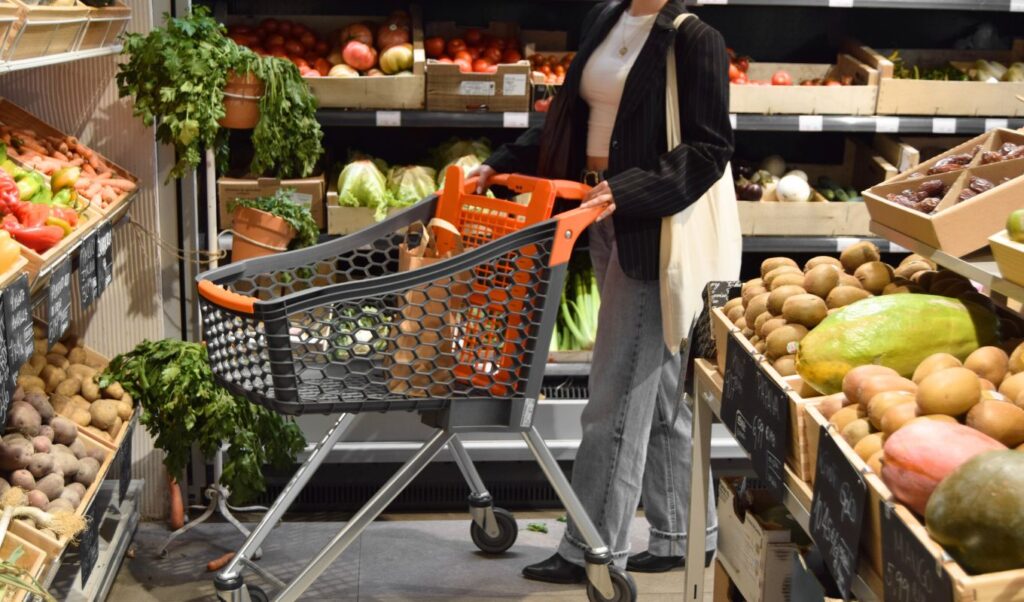Within the next few days, consumers are expected to see reductions in basic products they put in their basket when they go supermarket shopping, based on the new initiative by Development Minister Takis Theodorikakos. According to information from the Development Ministry, the notification process from supermarkets is progressing rapidly and the relevant announcements will be made within the coming week. In fact, as the data shows, the product codes will exceed 1000 and price reductions are estimated to range from 5% to 10%.
As Mr. Theodorikakos has stated, “the goal is for basic products related to nutrition, home maintenance and personal hygiene to see their prices drop by more than 5% and as much as possible for as long as possible.” Additionally, the minister emphasizes at every opportunity the importance of implementing the code of ethics and that inspections by DIMEA – and fines, whenever and if required – continue normally.
Inflation retreated in September
Already, inflation in supermarkets retreated in September to 0.6% from 1.6% in August, according to research by the Institute for Consumer Goods Retail Research (IELKA) which identified limited price increases in critical products over the twelve-month period. Specifically, the research finds a 0.76% decrease in product prices in supermarkets in September 2025 compared to August 2025. Also, inflation in supermarket chains is around +0.61% in September 2025 compared to September 2024, with a tendency for gradual de-escalation to lower levels compared to the previous 4 months. Overall, the rolling 12-month period (October 2024-September 2025) records an increase of +0.76%.
The largest price reductions in September 2025 compared to September 2024 are recorded in the following categories: Fresh fruits and vegetables (-5.63%), detergents and cleaning products (-5.4%), grocery foods (-5.18%), pet food and supplies (-3.21%), disposable items, household goods (-3.18%). The recorded reductions are the result of market normalization and decreased producer prices in certain products.
The largest reductions are recorded in fresh fruits and vegetables (the reduction comes from the vegetable category which has recently benefited from weather conditions), in detergents and cleaning products, and in grocery foods (also due to the de-escalation of olive oil prices).
The largest increases in September 2025 compared to September 2024 are recorded in the following categories: Fresh meat (+10.18%), cookies, chocolates, sweets (+9.88%), breakfast items and beverages (+6.06%), dairy and refrigerated juices (+4.26%), frozen goods (+3.82%). Regarding increases in fresh meat, this is a development due firstly to increases in international prices of imported items, especially beef due to reduced livestock (it’s noted that the majority of beef and pork consumed in Greece is imported) and also to animal diseases that affected many farming areas in Greece, especially lamb and kid goats. As emerges from the research, during the week of August 15-21, 2025, the producer price of beef for young male animals in the European Union increased by 35.4% compared to the same week in 2024 and 23.5% compared to early 2025, while the trend remains upward.
International prices of cocoa and coffee affect the categories of sweets and breakfast beverages, as well as frozen goods (e.g., ice cream, sweets). Regarding cocoa prices, increases in raw material prices internationally over the last two years, due to climatic conditions, were very high. In June 2025, prices of 168.9% are recorded compared to the same month in 2023. Compared to the same month in 2024, prices are relatively close, but in previous months prices reached as much as $10,710 per ton. At the same time, prices have not yet stabilized. It’s noted that due to the nature of products using cocoa, by-products (chocolate) as well as final products (sweets) are produced in subsequent years with different prices.
Food inflation lower in Greece than EU
Meanwhile, IELKA analyzing data provided by Eurostat concluded that food inflation in Greece is recorded at 2.6% according to Eurostat’s harmonized consumer price index, which reflects the change between August 2025 and August 2024.
Overall, the European Union records food inflation of 3.9%. Greece records the 4th lowest rate in the European Union for that specific month. The highest rate is recorded in Romania with 9.1% (which implemented increases in VAT rates in the previous period) and the lowest in Cyprus with deflation of -2.3%, which applies zero VAT rate to several basic items in 2025.
It’s noted that the Eurostat index covers all food and beverage sales points, meaning besides supermarkets also small non-specialized stores, grocery stores, specialized shops, bakeries, butcher shops, fruit vendors, farmers’ markets, etc.
Regarding specifically fresh meat prices and fresh beef prices, Greece records 7.5% inflation for fresh meat and 15.7% for fresh beef. Although these prices are higher than the European average of 4.5% and 11.8% respectively, Greece records one of the lowest performances compared to other countries in fresh beef and ranks 10th. France records the lowest increase at 6% while the Netherlands records the highest increase at 29.8%.
In other food subcategories, Greece records lower inflation than the European Union in bread and cereals 1.0% vs 1.9%, in dairy 0.2% vs 4.6%, in fats and oils -20.3% vs 6.0%, in sweets 6.5% vs 7.5%, in other foods 1.2% vs 1.3%, and in non-alcoholic beverages 6.4% vs 8.5%, while recording higher inflation than the European Union in fruits 19.2% vs 9.5% and vegetables 0.4% vs 0.3%.
9 billion euro turnover for supermarkets in eight months
The fast-moving consumer goods (FMCG) market in supermarkets moved upward during the eight-month period January-August 2025, according to Circana data, showing a 6.6% increase in sales value, mainly thanks to the food category. Fixed barcode products strengthened by 5.8%, while random weight or “bulk” products recorded an even higher rise of 9.3%.
The total FMCG market turnover reached 9.087 billion euros, compared to 8.524 billion euros in the same period of 2024. Of this, 7.049 billion euros came from fixed barcode products and 2.039 billion euros from random weight products – a category that exclusively concerns food items. Thus, fixed barcode products covered 77.6% of total supermarket turnover.
Private label continued its upward trajectory, recording a 7.4% increase and 27.1% market share, compared to +5.3% for branded products. Specifically, PL share in food reaches 27.7%, in health and beauty items 19.9%, and in household care 26.7%.
Regarding promotional activities, 24.3% of eight-month sales came from discounted products, a percentage reduced by 1.1 percentage points compared to last year.
By store category, hypermarkets (over 2,500 sq.m.) recorded the largest increase with +7.2% in sales value, covering 11.7% of total turnover. Small stores (0-400 sq.m.) followed with +7.1% growth and 12.1% share. Medium stores (1,000-2,500 sq.m.) made the largest contribution to total sales, providing 43.6% of turnover and recording +5.7% increase. Stores of 400-1,000 sq.m., with a 32.7% share, strengthened by +3.9%.
Geographically, the Islands recorded the largest sales increase with +10.0% in value, followed by Crete (+7.7%) and Peloponnese (+6.7%). Their participation rates in total turnover amount to 9.3%, 7.4%, and 8.3% respectively. Attica, which remains the strongest market with 41.4% of total turnover, also showed positive performance with a 5.4% increase.




